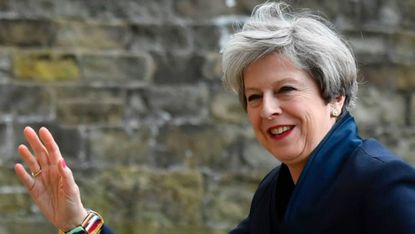Theresa May calls on G7 to combat online extremism
World leaders urged to put pressure on companies such as Google and Facebook to help fight 'hateful ideology'

Theresa May will push for world leaders to work harder to combat extremism on social media and elsewhere online in the wake of the Manchester attack.
She will tell leaders at the G7 summit in Sicily that more pressure should be put on tech and social media companies to remove extremist material from their sites, arguing that the fight has moved "from the battlefield to the internet".
According to the Daily Mirror, May's speech will also contain a plea for "leading countries to form a co-ordinated effort to force firms like Google, Facebook and Twitter to do more" to block material deemed extreme or illegal.
Subscribe to The Week
Escape your echo chamber. Get the facts behind the news, plus analysis from multiple perspectives.

Sign up for The Week's Free Newsletters
From our morning news briefing to a weekly Good News Newsletter, get the best of The Week delivered directly to your inbox.
From our morning news briefing to a weekly Good News Newsletter, get the best of The Week delivered directly to your inbox.
Speaking at Downing Street today, the Prime Minister said she would lead the counter-terrorism discussion in Sicily on "how to work together to prevent the plotting of terrorist attacks online and to stop the spread of hateful extremist ideology on social media."
Nato and the G7 working together could "enable us to work more closely together as we work to defeat the evil of terrorism", she added.
May believes the pressure put on social media companies should focus on developing tools that could "automatically identify and remove harmful material" based on its contents, informing authorities when this harmful material is spotted, and revising industry guidelines "to make them absolutely clear about what constitutes harmful material", reports The Guardian.
Security minister Ben Wallace told the BBC that the use of social media was "one of the biggest challenges" in the fight against extremism.
Encryption made it "almost impossible for us to actually lift the lid on these people", he said, adding: "We are determined to not let [tech companies] off the hook with the responsibility they have in broadcasting some horrendous [material], not only manuals about how to make bombs, but also grooming materials.
"We all think they could all do more... We need to have the tools to make them, where we need to, remove material quicker."
Facebook has come under scrutiny in particular over claims it is not doing enough to counter extreme material uploaded to its pages, the Guardian adds.
Create an account with the same email registered to your subscription to unlock access.
Sign up for Today's Best Articles in your inbox
A free daily email with the biggest news stories of the day – and the best features from TheWeek.com
-
 Nuclear near-misses
Nuclear near-missesThe Explainer From technical glitches to fateful split-second decisions, the world has come to the brink of nuclear war more times than you might think
By Rebecca Messina, The Week UK Published
-
 What is cloud seeding and did it cause Dubai's severe rainfall?
What is cloud seeding and did it cause Dubai's severe rainfall?The Explainer The future is flooded
By Devika Rao, The Week US Published
-
 American Airlines pilots are warning of a 'significant spike' in safety issues
American Airlines pilots are warning of a 'significant spike' in safety issuesIn the Spotlight The pilot's union listed 'problematic trends' they say are affecting the airline's fleet
By Justin Klawans, The Week US Published
-
 The Red Army Faction: German fugitive arrested after decades on run
The Red Army Faction: German fugitive arrested after decades on runWhy Everyone's Talking About Police reward and TV appeal leads to capture of Daniela Klette, now 65
By The Week UK Published
-
 Attacking the grid
Attacking the gridSpeed Read Domestic terrorism targeting the U.S. electric grid is exposing dangerous vulnerabilities
By The Week Staff Published
-
 Terror police probe uranium seized at Heathrow
Terror police probe uranium seized at HeathrowSpeed Read The radioactive substance was found during routine inspection of package flown into the airport
By Arion McNicoll Published
-
 Turkish government blames Kurdish separatists for Istanbul bombing
Turkish government blames Kurdish separatists for Istanbul bombingSpeed Read Blast in busy street on Sunday killed six people and wounded scores more
By Chas Newkey-Burden Published
-
 Manchester bombing report exposes ‘incompetence’
Manchester bombing report exposes ‘incompetence’Speed Read Newly published findings of public inquiry into 2017 attack describe a litany of failures
By The Week Staff Published
-
 The terrorism 'mastermind'
The terrorism 'mastermind'Speed Read Before he was killed in a U.S. drone strike, Ayman al-Zawahiri was one of the most wanted men in the world
By Catherine Garcia Published
-
 What we know about the Copenhagen mall shooting
What we know about the Copenhagen mall shootingSpeed Read Lone gunman had mental health issues and not thought to have terror motive, police say
By The Week Staff Published
-
 U.S. facing increased threat of extremism over next 6 months, DHS warns
U.S. facing increased threat of extremism over next 6 months, DHS warnsSpeed Read
By Brigid Kennedy Published